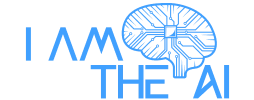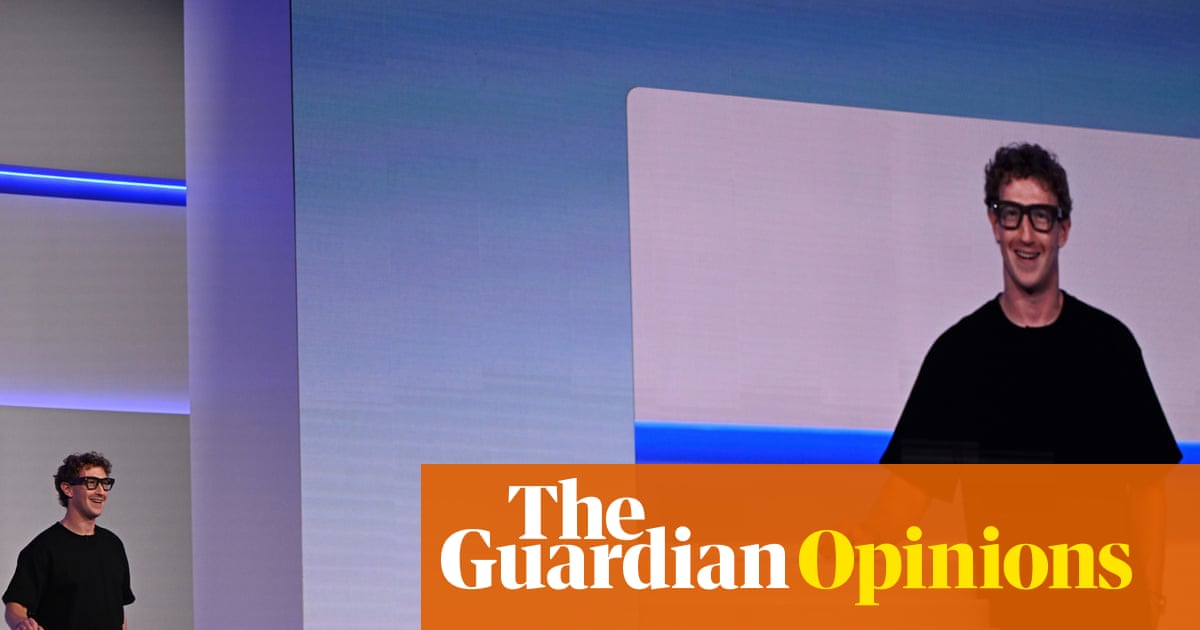As humanity inches nearer to an AI apocalypse, a sliver of hope stays: the robots won’t work.
Such was the case final week, as Mark Zuckerberg tried to display his firm’s new AI-enabled good glasses. “I don’t know what to inform you guys,” Zuckerberg instructed a crowd of Meta lovers as he tried, and failed, for roughly the fourth time to carry a video name along with his colleague through the glasses.
It was a limp follow-up to an formidable opening to the occasion at Meta Join 2025, a builders convention in Menlo Park, California, the place the corporate is headquartered. The keynote was to characteristic the Ray-Ban Meta Show, the most recent model of what’s basically a face-mounted iPhone – supreme for the buyer who lacks the vitality to tug a tool from their pocket and idolizes each Buddy Holly and the Terminator. Regardless of that plain attraction, the present was a technical mess – maybe the proper homage to the most recent pointless iteration of digital {hardware}.
The present had a promising begin. Viewers witnessed Zuck making his strategy to the stage to thumping music, performing an alarming variety of fist bumps en route. The second was offered onscreen via the digital camera on his glasses, in order that the viewers might see “Mark’s POV”. All of the whereas, he was receiving a flurry of textual content messages expressing enthusiasm that was little doubt real: “Let’s gooo” adopted by a rocketship emoji, “viewers is getting hyped” with an image of two guys trying content material at finest, a gif saying “It’s time.”
Lastly, Zuck reached the stage, in his now signature huge T-shirt and curls. He defined the corporate’s dedication to enticing eyewear, to the supremely ironic notion that “the know-how must get out of the way in which” of human interplay, and to “taking superintelligence severely”. Superintelligence goes to be “an important know-how of our lifetimes. AI ought to serve individuals, not simply be one thing that sits in a knowledge middle automating giant components of society,” he stated, sweetly assuming that society will exist past the subsequent decade.
Issues rolled alongside easily sufficient till it got here time to really use an AI characteristic. Zuck held a video name with chef Jack Mancuso, suggesting he make “possibly like a steak sauce, possibly Korean-inspired sort factor”, which Mancuso admitted he had by no means made earlier than, so he “might positively use the assistance” of AI.
“What do I do first?” he requested the oracle.
“You’ve already mixed the bottom components,” the AI knowledgeable him wrongly, “so now grate a pear so as to add to the sauce.” Lengthy silence.
“What do I do first?” Mancuso requested once more.
“You’ve already mixed the bottom components, so now grate the pear and gently mix it with the bottom sauce,” the AI patiently reminded him.
“I believe the wifi may be tousled. Sorry. Again to you, Mark.” (Definitely it was the wifi and never the AI itself.)
To his credit score, Zuckerberg remained poised. “It’s all good. You already know what? It’s all good,” he stated. “The irony of the entire thing is that you just spend years making know-how, after which the wifi on the day form of catches you.”
AI demo failures are nothing new. They’re one thing of a custom at Google, the place final yr a presenter used its Gemini software to scan a Sabrina Carpenter live performance poster itemizing her tour dates. “I’ll simply open Gemini, take a photograph, and ask: ‘Verify my calendar and see if I’m free when she’s coming to San Francisco this yr.’” The bot’s response was lifeless silence. (It lastly labored on the third strive, on a special system.)
This yr, when Google confirmed off a translation characteristic by itself good glasses, it failed after about 15 seconds. To be honest, simply because there’s an error in a high-stakes tech presentation doesn’t imply a product gained’t work, as anybody who watched a sure Tesla Cybertruck presentation will recall. When a designer threw a steel ball on the truck’s “armor glass” home windows, it smashed them. That truck went on to an excellent future, incomes the coveted title of “deadlier than a Ford Pinto”.
At this level in his presentation, you may assume Zuckerberg would go away nothing to probability. However when it got here time to display the Ray-Ban Meta Show’s distinctive new wristband, he opted in opposition to utilizing slides and determined to strive it stay.
The wristband is what he referred to as a “neural interface” – in a genuinely exceptional feat of know-how, it permits you to sort via minimal hand gestures, selecting up on {the electrical} indicators going via your muscle groups. “Typically you’re round different individuals and it’s, um, good to have the ability to sort with out anybody seeing,” Zuckerberg instructed the gang. The pairing of glasses and wristband is, in brief, a stalker’s dream.
A minimum of when it really works. Zuckerberg tried to name his colleague Andrew Bosworth over and over, the viewers sitting in silence because the incoming-call music performed. However the CEO was unable to select up. “That’s too dangerous. I don’t know what occurred,” he stated after the primary failed try. Then got here one other – “I’m simply gonna decide that up with my neural band,” he stated with a straight face – however once more, he couldn’t do it, because the “missed video name” alerts stacked up on the onstage show, nonetheless exhibiting “Mark’s POV”.
“I don’t know what to inform you guys, alright, however we’re gonna have Boz come out right here and we’re simply gonna go to the subsequent factor that I needed to point out and hope that can work.” An indication in the back of the room, seen onscreen, learn: “Dwell demo – good luck”.
If it was all an train in humanizing Zuckerberg, it labored: it was straightforward to pity the boy marvel, 41, as he fidgeted with the controls and did his finest to smile via all of it.
However the occasion as a complete felt like an out-of-touch millennial nightmare, a surreal relic of early 2000s optimism that solely a cloistered Silicon Valley billionaire might embrace. The fanfare was harking back to Steve Jobs’ unveiling of the iPhone in 2007, with two huge variations: again then, the US wasn’t collapsing offstage – no less than not so clearly – and in the meantime, it was abundantly clear why an individual may really want the system being introduced. It was the web! In your pocket! When might we get our palms on this marvel of human ingenuity?
This occasion – and far of the AI push, as generative instruments are crowbarred into {hardware} and software program that appeared to work advantageous with out it – desires to harness the identical vitality with out a remotely comparable product.
To a layperson, no less than, evidently client know-how has lengthy since entered an period of options searching for issues – notably troubling at a time when the world is dealing with so many genuinely intractable crises. As entertaining as it’s to look at our tech overlords flounder on stage, it raises greater questions, comparable to: who precisely requested for this, past the billionaires cashing in? And: can we simply not?

